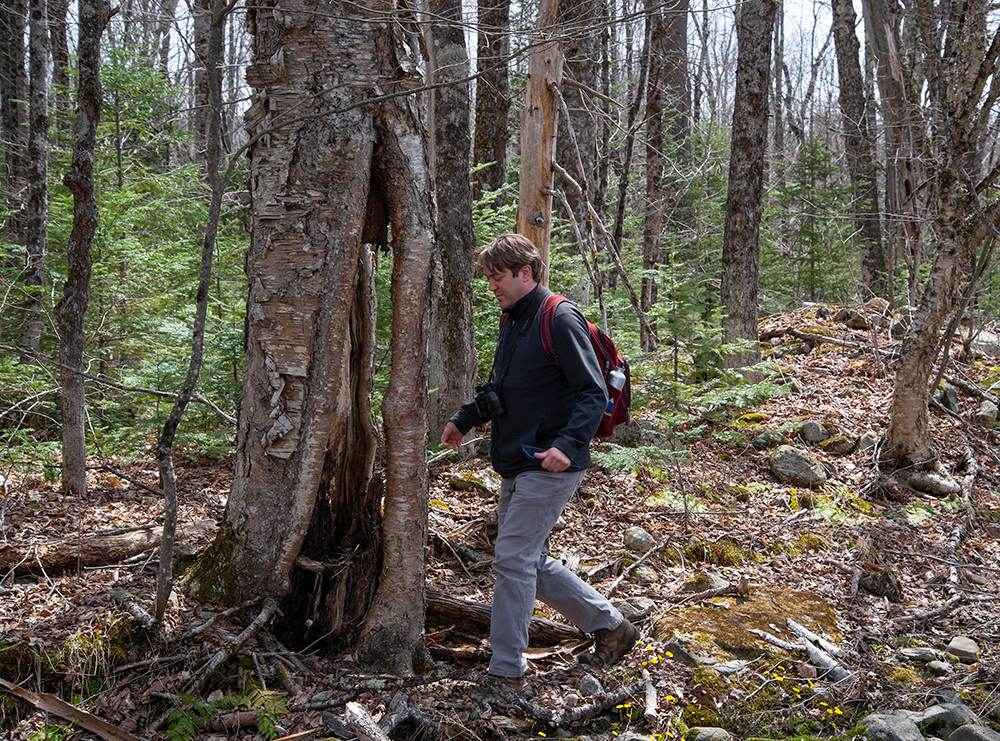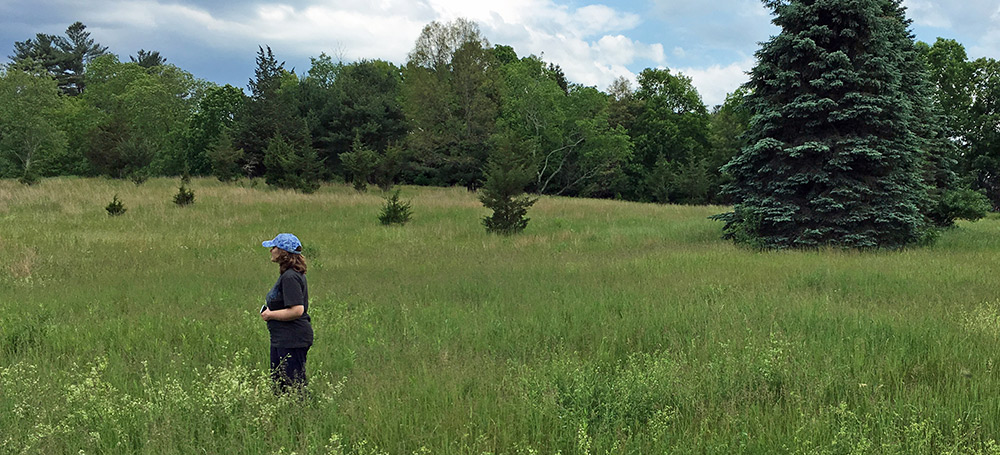Writing by NEFF’s Development Communications Specialist David Ayers, Conservation Easement Director Andrew Bentley, Executive Assistant Meaghan Guyader, Outreach Manager Lisa Hayden, and Bioeconomy Initiative Director Jennifer Shakun
For those of us who work in the land trust world, spring means spotting spring ephemerals, listening for migratory songbirds… and conferences. While this is likely not one of the first things that comes to mind when the uninitiated think about conservation organizations, New England Forestry Foundation (NEFF) staff members do regularly trot off to a variety of useful springtime conferences where they network, attend career development sessions, give presentations on their work, generally get a sense for trends in their field, and more.
–Tinsley Hunsdorfer, NEFF Communications Manager
On Saturday, March 25, four NEFF staff members attended the Massachusetts Land Conservation Conference (MLCC) at Worcester Technical High School in Worcester, MA, while another attended the Connecticut Land Conservation Conference (CLCC) at Wesleyan University in Middletown, CT. The staff, each from different departments and with varied backgrounds, wrote briefly about their experiences and impressions of the conferences.
Jennifer Shakun, Bioeconomy Initiative Director
I presented on climate-smart forestry at the MLCC, along with two of New England Forestry Foundation’s close collaborators: Jennifer Fish, Service Forestry Program Director at the Massachusetts Department of Conservation and Recreation, and Josh Rapp, Senior Forest Ecologist at Mass Audubon. Together, we explained how climate-informed forest management can make forests more resilient to the effects of climate change and how we can maintain or boost their carbon-saving potential. We also introduced several new state and regional programs that aim to help landowners plan and implement this type of management, including NEFF’s Climate-Smart Commodities Partnership.
Two things struck me as I was preparing for this presentation. First, it’s a particularly exciting time to be working at the intersection of forestry and climate change. We have a strong foundation of supporting science and an increasing level of buy-in for implementation from forest landowners (large and small), agencies, and institutions. Second, because of the groundwork laid over the last five to 10 years—a collaborative effort of local, regional, and national partners, including NEFF—we are now able to define what constitutes climate-smart forestry and determine the most practical, impactful, and scalable ways to implement it that considers different forest types and land ownerships.
We are seeing the fruits of our efforts, most notably with the awarding of the $30-million USDA Climate-Smart Commodities grant. As I explain this vision to audiences, the reaction is always the same: hope. A rare, but welcome, feeling in the climate conversation!
David Ayers, Development Communications Specialist
After an 11-year career in higher education, this was my first MLCC and true initiation into the larger conservation community. It also happened to be the first MLCC held in person in four years. So, it seemed somewhat apt this would be my first professional conference. I felt less nervous knowing it was the largest social gathering for many since the COVID-19 outbreak back in March 2020. Understandably, people were eager to meet each other. The buzz was palpable—it seemed to swirl throughout the atrium of Worcester Tech, and the din of several simultaneous, separate conversations was an auditory experience I won’t soon forget. The environment was friendly, even jubilant. I felt welcomed immediately.
While the sessions themselves were interesting, I was perhaps most impressed by the partnerships at the MLCC—this being my first conference, after all. From large sponsors to individual attendees, each group seemed intertwined with each other. There was an assumed collective responsibility for the work we all share in. I was so moved by the level of dedication of everyone I met. Like Jen mentioned, I felt there was good reason for hope for the future of our planet.
I can’t wait to attend next year’s conference, at which point I will have learned more about the environmental space!
Meaghan Guyader, Executive Assistant
This was my first time attending MLCC. The night before the conference, I was able to join their Early Career Conservation Network (ECCN) engagement event at Mass Audubon’s Broad Meadow Brook Property. The Central Regional Director, Jennifer Madison, showed us around their all-persons trail and emphasized the center’s commitment to accessibility for the broader Worcester community by having a bus stop on their campus.
The day of the conference, I tabled for NEFF and was able to talk with a range of professionals from urban arborists to invasive managers about NEFF’s USDA Climate-Smart Commodities grant and related hiring efforts. I was pleased to sit in on the keynote session devoted to planning for affordable housing in conjunction with conservation in urban areas of Massachusetts. It was great to hear comments from the audience encouraging MLTC’s network to pick up this work in suburban and rural areas throughout the state.
My favorite session at the conference was the “Principles for Respectful Partnerships” workshop. Andre Strongbearheart Gaines and his partners at Mount Grace and Hilltown land trusts reviewed the history of land treaties and violence committed against the indigenous peoples of the northeast. The workshop advocated for ongoing opportunities to bring the Nipmuc and other tribes’ 10,000+ years of indigenous expertise into land stewardship today. I’m so glad I was able to get exposure to MLTC’s vibrant community and I look forward to returning next year!

NEFF Conservation Easement Director Andrew Bentley tours the Whalen family forestlands during NEFF’s 2022 easement visit. Photo by Tinsley Hunsdorfer
Andrew Bentley, Conservation Easement Director
I was delighted to once again attend the MLCC and connect with friends old and new. This was my sixth time attending—possibly eighth, I’ve lost count. I have enjoyed the conference as an attendee, volunteer, and presenter (sometimes all three at the same time). I first attended as a volunteer while in graduate school at UMass Amherst in 2010, not knowing this would be a turning point in the path to a career.
As fate would have it, I happened to network with staff from The Trustees of Reservations who sent me a note afterward that their Conservation Restriction program could use an intern at the Doyle Center in Leominster. I eagerly accepted the opportunity and was beyond lucky to springboard from there to a job with The Trustees for the next seven years until I departed to join NEFF in 2017. A past Trustees volunteer who visited the “First-Timers” table I helped coordinate in 2015 is now the Program Coordinator at MLTC and organizes the whole conference. I love that it’s an event where newcomers and experienced practitioners learn and share, and where connections are made that strengthen collaboration and can come around full circle to career paths.
This year, I enjoyed being an attendee and not sweating over presentation jitters or volunteer tasks. I first attended a fascinating presentation on managing forests to promote development of old-growth characteristics by UMass Professor and Extension Forester, Paul Catanzaro, who emphasized that a balance of active management and leaving forests alone can lead to old forests—a nearly absent element from the current New England landscape. A case study from Central Massachusetts followed, which was presented by Tom Lautzenheiser of Mass Audubon.
The keynote topic, “Affordable Housing and Conservation – Not an Either/Or,” was incredibly timely with housing out of reach for so many state residents. There are no easy solutions, though it’s encouraging that Boston city departments, state agencies, land trusts, and community land trusts are seeking to collaborate to find this balance. I hope they will consider and promote renewable and climate-friendly wood construction for new housing, with materials sourced from New England’s resilient forests.
At the last session, I refreshed myself on the fundamentals of Terrafirma Conservation Defense Insurance—NEFF has held a Terrafirma policy covering all conservation easements since 2013 and this year we insured our Community Forests. When a serious trespass or easement violation takes place and an enrolled land trust files a timely claim, Terrafirma will pay certain legal costs to defend conservation land from challenges. It’s a comfort knowing NEFF’s conservation land is protected by such a comprehensive and yet specialized risk protection tool.
The entire conference flew by! I departed with a big smile after another positive and informative experience—how great to be back together!

NEFF Landowner Outreach Coordinator Lisa Hayden explores land once owned by her family that is now protected by a land trust. Photo by Ken Heidel
Lisa Hayden, Outreach Manager
As a NEFF staff member who grew up in rural Connecticut and still owns a small piece of family land there, I’ve enjoyed sharing my personal perspectives in my work supporting woodland owners to consider their options for caring for and conserving their forest properties. And so, while many of my colleagues were at the Massachusetts conference on a March Saturday, I headed south to Middletown, CT, where the Connecticut Land Conservation Council was also hosting its annual conference for the land trust community at Wesleyan University on the same day.
Back in March 2020, I had been scheduled to speak on sustainable forestry with a co-presenter from the Connecticut Department of Energy & Environmental Protection when it seemed like the whole world shut down due to Covid, and the in-person event was canceled. So, it was especially exciting to be back in person at this conference, where I was finally able to join with forester Andrea Urbano, Supervisor of Private & Municipal Lands for CT DEEP’s Division of Forestry, to speak about “What Is Climate-Smart Forestry and How Can It Help the Planet?” We had an attentive audience that seemed interested to learn about new funding opportunities and the consensus emerging about “climate-smart” forestry practices that support both biodiversity and human needs while keeping more carbon out of the atmosphere.
Some of the conference themes were sobering—as the keynote speaker addressed “Coping With Your Green Angst,” amid the climate and biodiversity crises. But among the sessions I was able to attend, from the climate resilience benefits of beavers to efforts to create corridors across the landscape for pollinators and wildlife movement, the power of organizations and individuals working together was evident. As landowners learn about how they can help address climate change on their land, and as land trusts team up to conserve forests at a larger scale and increasingly invite people with diverse perspectives to the table, in CT, I too, saw examples of David’s observation that all of us in this movement are intertwined—and when we work together, what a powerful force for positive change we can be!
